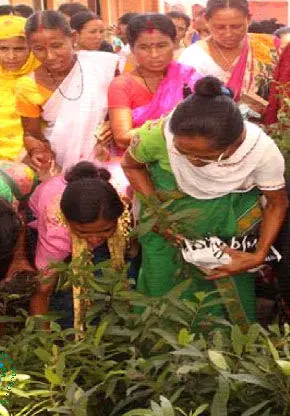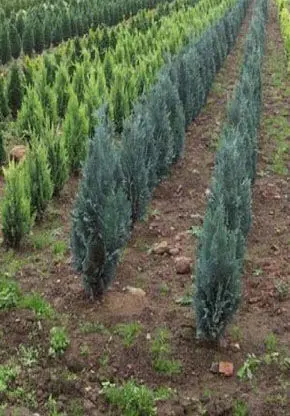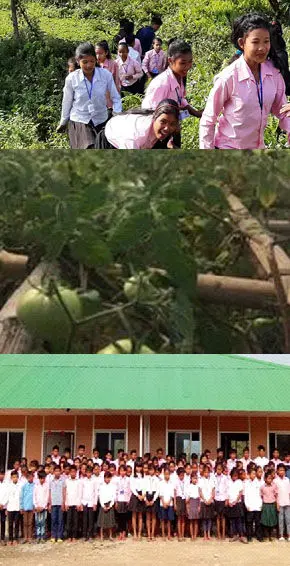The Assam Investment Advisory Society was born out of a desire to bridge the gap between disadvantaged communities in Assam, and the key universal basic assets needed for real socioeconomic mobility: education, energy, access to water, livelihoods and healthcare. Women have been the prime motivator of this vision, as visionary leaders who see the bigger picture for their communities and are unafraid to demand more and work for the well-being of their communities.
To build sustainable livelihoods for women, we expanded our vision to include investment in nature-based solutions and environment. Resilient nature is economics and investing in nature creates a robustness which is sustainable – for both communities and for women’s incomes. Through nature, we believe women will have the means to achieve true social independence.
Educate a girl and you educate a nation – reminds us of the power women have to shape the future of countries. The truth of this maxim has never been more important than now, with global progress on closing the gender gap under threat as COVID-19’s economic effects have disproportionately fallen on rural and urban women. Our rural areas fought with pride to defend and overcome the challenges of rural areas.
We have a long way to go in achieving this vision, but through critical investment in education, communities and creating economic opportunities for women, the Assam Investment Advisory Society takes one step closer to its vision of communities taking control of their futures and using collective action to generate solutions to common problems.
Women inspire – 2019 in review
Partnering with the NGO ASTHA in Bhairabkunda, we worked alongside the women of the community to curate a unique forest homestay experience for tourists to experience the biocultural richness of the region. Blending natural and cultural heritage, the initiative would create alternate, nature-friendly sustainable livelihoods for the community, while highlighting the area’s diverse heritage. A group of 10 women were given special training and skill development to take on a hospitality role and manage the homestay, earning INR 134,000 over the past year.
In Balipara county, we undertook a tourism training with indigenous women from the Garo, Boro, Adivasi, Nyshi, Mech-Kachari, Assamese, Mishing and Nepali communities, to instil an understanding of the immense value of their cultural and traditional knowledge and the opportunities for tourism in their backyards. The training targeted over 60 women with special knowledge training and exposure visits. Over 6 women began their own homestays as a result of this training, and 2 other women are now working in a similar field as well.
We further invested in enhancing skills for fostering financial independence in women in collaboration with the Centre for Microfinance and Livelihoods and Don Bosco Society. Partnering with indigenous Mising women in Baligaon, Sonitpur district, we provided jacquard looms for 20 women of the community, as well as training and skill upgradation for them to augment their weaving and maximize their earnings. The training enabled them to broaden their design range and enhance the overall quality of their products, enhancing their livelihood opportunities by 50%. With Don Bosco university, we conducted a hands-on workshop for over 40 rural women to enhance their hospitality and digital skills – with a special focus on creating self-sufficiency through the use of digital technology.
Nature-centred Inclusivity - 2019 in review
Our society deeply values cultural inheritances deeply intertwined with nature. Nowhere is this more evident than among Assam’s indigenous communities. In July 2019, in celebration of Van Mahotsav, we partnered with the Balipara Foundation, 134 Eco Task Force and Mahila Shakti Kendra (with support from the Assam State Forest Department and Assam State Rural Livelihood Mission) to secure and propagate natural assets of the Eastern Himalayas. In 30 minutes over 9000 households across Sonitpur district came together to plant over 2.85 lakh saplings and seed balls. Over time, these saplings will promote alternate sources of livelihoods among the communities, and restore green cover for critical climate action.
Placing nature at the centre of education, we enhanced infrastructure in a community run village school, providing solar power and access to water for 250 students at the school. Environmental education and agricultural skilling is now a critical part of the school’s curriculum, using real in-situ learning among regenerated forests as learning tools and giving students the opportunity for a hands-on understanding of the circular economy through nature tourism components, as well as the school’s food forest based revenue generation programme. Equipped with these skills, students graduating after school who wish to continue doing agricultural work no longer need expensive formalized training as they already have the practical knowledge and skills needed to take up agriculture, nature tourism or nursery work. Through food forests and sustainable fisheries, the school will earn revenue to be completely self-sustaining post-exit.
We were also fortunate to have the opportunity to support the physically challenged players of Assam to participate in 6th National Championship of Wheel Chair Basketball Championship in Mohali, Punjab, alongside Shishu Sarathi.
Looking ahead: 2020 and beyond
A sustainable future for Assam is a green future. As we continue to work towards creating opportunities for women, and strengthening education, we broaden the scope of our vision and work to centre nature positive outcomes.
In addition to expanding nature education at the Baligaon Forest Community School, we will be deepening our engagement with nature-based solutions through food forestry in Baligaon village – the Ghar Bari programme – impacting 350 households. The sustainable livelihoods provided through agroforestry will be further augmented by proposed projects in mushrooms for livelihoods and the seeding of a nursery in Baligaon Mising village, as well as another at the Baligaon School to support agroforestry and regeneration programmes – providing income to pay for the school’s infrastructure as well as giving children the opportunity to learn hands on skills in farming and agriculture. Women continue to be our special focus, with over 250 women targeted for training and capacity building through these projects.
The Society continues its community-based elephant monitoring programme with Mahila Shakti Kendra (MASK) in Sonitpur District of Assam, which has already successfully reduced property loss in target areas from 20 to 15 instances of property damage, and supported 5 families in restoring their destroyed homes. In addition to tracking elephants, managing dispersal and an insurance scheme for the community to mitigate human-elephant conflict, we aim to bring this information online for publicly accessible real-time updates. Together, this will play a critical role in helping communities along elephant corridors to coexist peacefully with these endangered creatures.
We continue to be inspired by the women of our communities – the social fabric that binds our diverse people together. The women will lead our programmes and we see a bright future for the communities of Assam through better education, better livelihoods, and better natural assets for better opportunities.


